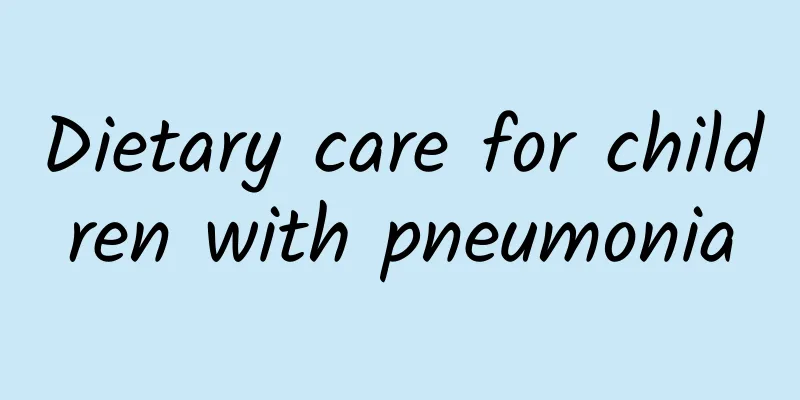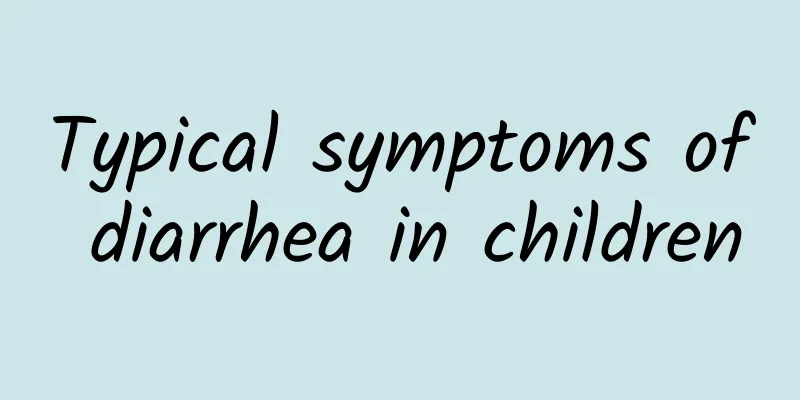Dietary care for children with pneumonia

|
Pediatric pneumonia is a common respiratory disease in children. Parents need to take good care of their children's life and diet while actively treating them. So what are the better dietary care methods? The following is an introduction to the dietary care methods for pediatric pneumonia for your reference. Nursing methods for children with pneumonia Fresh environment A quiet, clean environment with appropriate temperature and humidity is conducive to the recovery of children with pneumonia. The room temperature should be kept at around 20℃ and the relative humidity should be 55-65% to prevent respiratory secretions from drying up and making it difficult to cough up, thus preventing cross infection. There should not be too many people in the room where the baby stays, and visitors should not stay too long. The room should be ventilated regularly to ensure air circulation, but drafts should be avoided, which is conducive to the recovery of pneumonia. Hydration Drinking more water can help the discharge of phlegm and the normal functioning of the body. Therefore, mothers should encourage children to drink more water, help and guide parents to pat their children's backs and turn them over to promote the discharge of phlegm. In addition, breastfeeding should be done as much as possible. If artificial feeding is used, the amount and concentration of milk can be determined according to the digestive function and condition of the child. If there is diarrhea, skim milk should be given. For infants or children, a light, easily digestible diet rich in multiple vitamins should be provided. Children in the recovery period should be given nutritious, high-calorie food. For critically ill children who cannot eat, intravenous infusion should be given to supplement calories and water. Breathe easily When children have pneumonia, they are restricted and have varying degrees of hypoxia in their bodies. Therefore, mothers should promptly remove nasal crusts, nasal secretions, and respiratory sputum to improve ventilation function, increase alveolar ventilation, and correct hypoxia. Oral Care Patients with pneumonia who have a lot of sputum should try to cough up the sputum to prevent the poor discharge of sputum from affecting the recovery of pneumonia. If the condition allows, parents should often pick up their children and pat their backs gently. Bedridden children should turn over frequently, which can prevent lung congestion and make it easier to cough up sputum, which helps recovery. Physical Exercise Mothers can often take their babies outdoors, but they must ensure that the activity location has fresh air. Let the baby get more sun to improve the ability to adapt to temperature changes, and add or remove clothes according to weather changes. Feed the baby reasonably, add complementary foods in time, do not eat partial or picky food, develop good eating habits, get vaccinations on time, and avoid going to public places during influenza to avoid cross infection. Dietary taboos for children with pneumonia Cold food Children with pneumonia should not eat raw and cold foods such as sugar cane, watermelon, ice cream, frozen drinks, bananas, raw pears, etc. This is because eating them can easily lead to the depletion of yang in the body, and if the yang is damaged, it will be unable to resist the evil and the disease will be difficult to recover. Therefore, they should be avoided, especially for children with digestive tract symptoms. Polysaccharide foods Sugar is a calorie supplement, but it is a taboo food for children with pneumonia. It has a simple function and basically does not contain other nutrients. If children with pneumonia eat more sugar, the bactericidal effect of white blood cells in the body will be inhibited. The more sugar is consumed, the more obvious the inhibition will be, which will aggravate the condition. Spicy food Spicy food can aggravate pneumonia in children, so patients should avoid eating it. Spicy food can easily turn into heat and damage body fluids, so children with pneumonia should not add chili oil, pepper or spicy condiments to their diet. Greasy and thick taste Foods like cod liver oil, crab roe, pine egg yolk, crucian carp roe, etc. are all greasy foods. If eaten by children with pneumonia, it will affect the digestive function, and the necessary nutrients cannot be replenished in time, resulting in reduced resistance to disease. Acidic drugs and foods Babies love sour and sweet foods! However, parents should pay attention. If the baby has pediatric pneumonia, they should stop taking acidic medicines and foods, such as Schisandra chinensis, black plum, vitamin C, sour fruit, orange, vinegar and other foods, as they can be astringent and astringent, and hinder sweating and relieving exterior symptoms. |
<<: How to take care of children with pneumonia
>>: Health care methods for children with pneumonia
Recommend
What are the key points of self-diagnosis of acute laryngitis in children?
What are the key points of self-diagnosis of acut...
What to do if your baby keeps having a dry cough
If your baby has a dry cough all the time, you ca...
What are the causes of indigestion in children? Babies with indigestion need to pay attention to these 3 principles
The spleen plays an important role in the digesti...
Can pediatric eczema be cured? Do you know the 4 common misunderstandings about pediatric eczema?
Parents regard their children as their treasures ...
What should we pay attention to when preventing and treating diarrhea in children? What kind of food should children avoid when they have diarrhea?
Children's diarrhea is caused by rotavirus in...
Is it toxic to eat red pigment?
Is edible red pigment toxic? This question may bo...
What is the most effective way to treat jaundice? How can mothers tell if their children have jaundice?
Jaundice, also known as yellow bile, is a symptom...
How to judge diarrhea in children
In our daily life, diarrhea in children is a very...
What are the common causes of colds in children? How to identify the type of cold in children?
Children's cold is one of the most common dis...
What causes high hemoglobin?
High hemoglobin levels usually mean that the body...
What are the examination methods for mumps
Nowadays, both the pace of life and the pace of s...
What are the treatments for polio?
The treatment of polio is actually not a very com...
What are the symptoms of polio?
Polio is a common disease that mostly affects chi...
Can acute laryngitis in children be cured?
Can acute laryngitis in children be cured? Many c...
Is pneumonia in children particularly dangerous?
Nowadays, most young men and women lack experienc...









